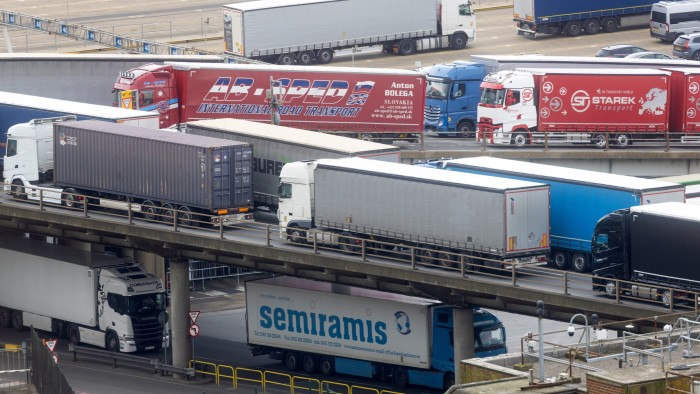Useful information
Prime News delivers timely, accurate news and insights on global events, politics, business, and technology
Useful information
Prime News delivers timely, accurate news and insights on global events, politics, business, and technology

Brexit has affected UK trade less than many forecasters predicted thanks to larger companies adapting to bureaucracy at the border, according to research from the London School of Economics.
Researchers estimated that the UK’s global exports and imports of goods fell by 6.4 and 3.1 percent respectively between 2020 and 2022, compared to the levels projected for the country to remain in the EU, according to the analysis. of company level trade data from HM Revenue & Customs for the first two years after Brexit.
The report by economists at the LSE Center for Economic Performance concluded that while the EU-UK Trade and Cooperation Agreement signed in 2020 “undoubtedly decreased trade”, the decline was “at least in the short term, lower than forecasters expected.”
The drop in trade as a result of Brexit represented a £27bn hit on exports and a £20bn reduction in imports in 2022, according to the LSE.
However, while the report found that larger companies had proven more resilient, smaller ones were hit hard, with more than 16,400 companies abandoning exports to the EU after 2021.
Thomas Sampson, co-author and associate professor of economics at the LSE, said that while the 6.4 per cent reduction in total goods exports was “not trivial”, it was still smaller than many pre-Brexit studies had predicted. .
He added that the TCA had been “a disaster for small exporters”, with many stopping exporting to the EU altogether, but “at the same time, larger companies have adapted well to the new trade barriers”.
The LSE’s findings, which are limited to trade in goods, will add to the increasingly controversial debate over the economic impact of Brexit. The effect on UK trade was initially clouded by the Covid-19 pandemic, which caused massive disruption to global supply chains, and other methodologies have modeled larger impacts.
Economists at Aston University have estimated that annual exports to the EU are 17 per cent lower and imports 23 per cent lower than if Brexit had not happened, with the negative impact increasing through 2023.
By contrast, the LSE report estimated only a 13.2 percent drop in the value of goods exported to the EU as a result of using different modeling techniques and a narrower sample.
Jun Du, an economics professor at Aston University, said she thought the LSE figures would probably be an underestimate because the analysis focuses on those companies that were already strong enough to trade with the EU and the rest of the world.
“These companies are the survivors, so if you infer the negative impact of Brexit only from the good companies, you get a more optimistic picture,” he added.
The Office for Budget Responsibility still estimates that Brexit will cause a long-term hit of 4 per cent on GDP as a result of impacts not only on trade, but also reduced investment and productivity in the UK economy. .
In terms of trade, the OBR forecastlast updated in May, is that total UK exports and imports of goods and services “will be 15 per cent lower over the long term”. The OBR declined to comment on the LSE document.
The LSE said that while there was “early evidence” that businesses are adapting to life outside the EU, the effects of Brexit would depend on the long-term impacts of the TCA which “have not yet been fully realised”.
Companies have warned of the effects of so-called “Brexit 2.0”, with new EU regulations (for example, carbon border taxes or new supply chain reporting requirements) making trade with the bloc more difficult over time.
However, even taking these future effects into account, the LSE’s Sampson said they would need to increase significantly for the OBR’s prediction of a 15 per cent long-term impact on imports and exports to be correct.
Sampson added that while larger companies had initially adapted better than expected, that did not mean they were not facing higher costs and reduced productivity as a result of dealing with new customs procedures.
“Adjusting to new trade barriers creates additional costs for businesses, which will likely translate into lower productivity,” he added. “There is also a risk to future trade growth, because we know that the big exporters of tomorrow are the small exporters of today, and they have clearly suffered.”
The Cabinet Office said the government had taken many steps to help smaller businesses, including the Export Support Service which was launched in 2021. “We want to restore the relationship with our European friends, address barriers to trade and make Brexit work for the British. people,” added a spokesperson.